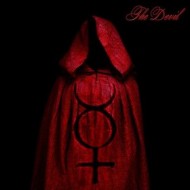 The Devil is a strange beast indeed, consisting, according to this self-named album’s cover art at least – of six cowled and masked individuals. Fittingly there is no hint of a band website [is now, see below Ed] , no Facebook. Youtube evidence consists of montages of disturbing archive footage and not a trace of the act itself. Didn’t St. Augustine himself intimate that disbelief is The Adversary’s greatest weapon?
The Devil is a strange beast indeed, consisting, according to this self-named album’s cover art at least – of six cowled and masked individuals. Fittingly there is no hint of a band website [is now, see below Ed] , no Facebook. Youtube evidence consists of montages of disturbing archive footage and not a trace of the act itself. Didn’t St. Augustine himself intimate that disbelief is The Adversary’s greatest weapon?
The only evidence for The Devil’s nature comes from Candlelight Records’ website. The Devil’s coven reportedly consists of six musicians. One can only speculate what they do. There is no singer in this ‘act’, and nary a guitar solo. Each track consists primarily of keyboard, and in place of vocals there are samples from press reports referring to disturbing subjects like UFOs or the Kennedy assassination. There are guitars, bass and drums on most tracks, but subdued and not challenging. It could easily be the work of one person.
The same source makes some claims which are surely disingenuous. The Devil is not, as billed, traditional Heavy Metal. While some parts contain epic sounding, sweeping sections of what could be considered metal due to the lack of a singer and actual songs this is misleading.
More accurately the project is also described as ‘a soundscape’. The only other information is an endorsement from a film director, and the album should probably be seen in this context – as a soundtrack. It should probably therefore be classed as ‘ambient’. This makes it difficult to rate as ambient albums are unusual in the Metal world (not unique – but the nature of “Hliðskjálf” and “Dauði Baldrs” were somewhat forced on their creator).
Opening track ‘Divinorum’, one of two purloined for use in a film, starts with atmospheric keyboards reminiscent of The Fields of the Nephilim’s masterwork “Moonchild” before stomping along in with some guitar and suddenly – that’s it! This is followed by a lengthy investigation of that UFO phenomenon everyone got het up about in the 1990s, until about the moment David Duchovny left ‘The X Files’.
“Astral Projection” sounds like a New Age music track would if Varg Vikernes had been trying to make a few kroner from his prison cell. This is followed by one of the album’s stand out tracks “World of Sorrow”, featuring some guitar playing a la Dave Mustaine. The samples are entirely drawn from news reports about 9/11: scary as hell and very effective.
“The Devil and Mankind” features some metal-ish guitar over a lot of blathering from President Kennedy, followed by some rather trite keyboard dwelling on his assassination. “TheSilentCity” consists of nothing but classical guitar and lengthy narration from an actor. This is followed by “Akasic Enlightenment”, which is similar, with an incredibly correct-sounding rant from an unknown individual, possibly Aleister Crowley.
“Extinction Level” is a heavy-ish exposition on the subject of nuclear power, which inexplicably fades out (couldn’t think of an end eh? NOBODY GOOD fades out in 2012!!!). “Intervention” is not even slightly interesting unless you enjoy Martin Luther King speeches set to keyboard.
“Illuminati” meanders on at length about who knows what, while “Transcendence” is just three notes played on a keyboard over and over with the wind blowing in the background. Only in the spirit of journalistic endeavour did I endure the entire track.
“Alternative Dimensions” thankfully returns to form with heavy, if simple guitar and drums. The samples consist of a very long conversation on the nature of belief between what sounds like two pub drunks. This is probably not the intended effect. Unfortunately, and as with a few of the other tracks, the conversation is partially inaudible, magnifying the illusion of inebriation.
The final track “Ascension” is just keyboard and bumbles along for an eternity. It then comes to rest on just one note, which has now been sounding for a good ten minutes. I could give it a few more minutes … but nothing whatsoever will happen.
It is often said that the devil has all the best tunes. In this context they certainly don’t.
However is this because the devil is intriguing and apt to fascinate? Is it that this music mirrors the human condition, the very lack of form, structure and refusal to reward the listener revealing the false hopes and expectations with which we load each day? As Larkin would have it – is all this just to stave off the constant knowledge that one day we too will die?
Could it instead be that the album is intended to refer back to that very quote by Saint Augustine, to show that hidden in the mass of the apparent mundane, in the events referred to in the songs, there lurks the hand of a real, living, lusting and entirely alien intelligence?
Or is it all just pretentious toss?
(5/10 Graham Cushway)

Leave a Reply